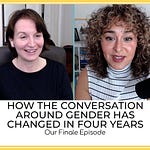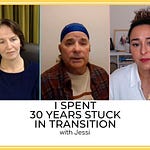The reason this interview is so important is bc the concept of puberty blockers originated with these two researchers (along w/ cohen kettenis.) We talk about patient zero and the 22 year follow up w/ this person. We get into the nitty gritty details about the 2 studies on which all puberty blocker treatment is based: we ask why they selected certain methods, talked about eligibility criteria, and the 15 participants who didn’t make it into the final study. We even touch on Jazz Jennings, social media, ROGD and detransition. This conversation felt, to us at least, like we barely scratched the surface: we were frankly left with more questions than answers, which we are so eager to talk about in our post series analysis. You’ll probably notice the vast differences between the perspectives of these researchers and of myself and Stella, but nonetheless it was a productive and fascinating conversation.
Bio: Steensma
Thomas D. Steensma, Ph.D., is a health psychologist, principal investigator and part of the outpatient management team at the Center of Expertise on Gender Dysphoria at Amsterdam UMC, The Netherlands.
Trained as a child and adolescent psychologist, his clinical work is focused on the counseling and treatment of people of all ages with gender incongruence and Differences in Sex Development (DSD).
As principal investigator, his research lines are focused on psychosexual development, gender identity development and treatment evaluation of youth with gender incongruence. Over the years, he has published over 50 peer reviewed articles in international journals and several book chapters in close collaboration with prominent scientists in the field of gender and sexology. He has co-supervised several Ph.D. and master students.
His recent scientific work is focused on understanding the developments in our field focusing on the change in observed sex ratios and the influence of media attention on gender referrals and understanding the processes and factors involved in non-binary gender identity formation.
He is currently part of the working group for the text revision of the DSM-5 chapter on Gender Dysphoria. In the development of the 8th version of the Standards of Care of the World Professional Association of Transgender Health (WPATH), he is part of two working groups: Assessment and Therapeutic Approaches of Non-Binary People and Assessment, Support and Therapeutic Approaches of Children.
Bio: de Vries
Annelou de Vries is a child and adolescent psychiatrist and full staff member in the dept of child and adolescent psychiatry working at the Amsterdam UMC.
Annelou de Vries is leading the Child Psychiatry Department of the Center of Expertise on Gender Dysphoria of the Amsterdam UMC. She is president elect of the European Professional Association of Transgender Health (EPATH) . She is co-chair of the adolescent chapter of the Standards of Care revision of the World Professional Association of Transgender Health (WPATH).
At present, her lines of research focus on 1) the co-occurrence of autism and gender dysphoria, 2) capacity for informed consent of transgender adolescents, 3) long term follow up of transgender adolescence into middle adulthood, 4) sexual development of transgender adolescents, 5) shared decision making in transgender care, and 6) pathways in gender identity exploration and affirmation.
Links:
Young adult psychological outcome after puberty suppression and gender reassignment
https://pubmed.ncbi.nlm.nih.gov/25201798/
Puberty suppression in adolescents with gender identity disorder: a prospective follow-up study
https://pubmed.ncbi.nlm.nih.gov/20646177/
Extended Notes
When did Thomas and Annelou first hear about the concept of puberty blockers?
Thomas and Annelou talk about the very first case of puberty suppression.
Were there any counseling measures attempted to relieve the distress of this first case?
Stella asks about the follow-up from the study by Peggy Cohen Kettenis in 2011 where a transitioner could not sustain a long-term relationship and was still ashamed of their genitals.
Thomas talks about the motivation behind follow-ups and the aim of each study.
Stella asks about the gender dysphoria scale used in their studies in 2011. Why were the scales changed after treatment?
Thomas talks about the Utrecht Gender Dysphoria Spectrum Scale by JK McGuire and how they are using this now.
Annelou explains their 2014 clinical study and the different follow-ups they made on these cases.
Stella mentions that the majority of the seventy children in their study developed a level of obesity while on treatment. Annelou and Thomas describe their selection process.
There were fifteen people that were not followed up upon in the second study. Annelou talks about one of the patients who died through the cross-sex surgery.
Did the puberty blockers create a problem to transition? Did this occur with the children in their studies? Annelou and Thomas talk about the different surgical techniques for transitioning.
Where in the early stages did the work of chronologists and surgeons come into play? What was the influence of the medical community on how they conceptualize gender distresses and how to treat them?
Are there cases that the diagnosis for the child coming in was not gender dysphoria but other psychological issues? Annelou shares their process of assessment through multidisciplinary meetings.
Thomas shares that it’s not their job to decide whether the patient has gender incongruence but rather understand and find out how that feeling developed.
Stella questions the significant improvements in these studies to be associated with maturing of the child. Thomas explains their population.
The scale is not ideal but after treatment, the patient would say their gender dysphoria has improved a lot. That’s the reason they go through the treatment.
Annelou shares the different distresses that the LGBTQ community suffers from that are not only limited to gender. Therefore, mental health isn’t the best outcome measure.
Can you become gender dysphoric as a teenager because of the obsession on gender? Stella asks in relation to today’s generation.
Part of adolescence is searching for one’s identity and it’s the role of parents to help these adolescents form for the rest of their lives.
Annelou shares her thoughts about Lisa Littman’s study on ROGD.
There is so much more going on than the reasons others think that things are changing. Thomas shares it’s important to explore things first and not go fast.
He also shares the societal influences in the changes they observe today vs. in the past.
The Littman study is framed as a warning but the decisions in terms of the medical steps are still as difficult as they were 20 years ago.
It depends on which theory you work but both Thomas and Annelou share that the phenomenon of gender diversity has not changed significantly over time.
Thomas and Annelou share their thoughts on de-transitioners.
We used to think that gender incongruence was something permanent, but we now have what we call fluidity. It’s important to be really careful going through these processes.
The safe and slow approach on gender dysphoria in the U.S. vs. Amsterdam. Stella asks them both what is the difference.
This podcast is sponsored by ReIME and Genspect. Visit Rethinkime.org and Genspect.org to learn more.
For more about our show: Linktr.ee/WiderLensPod.











